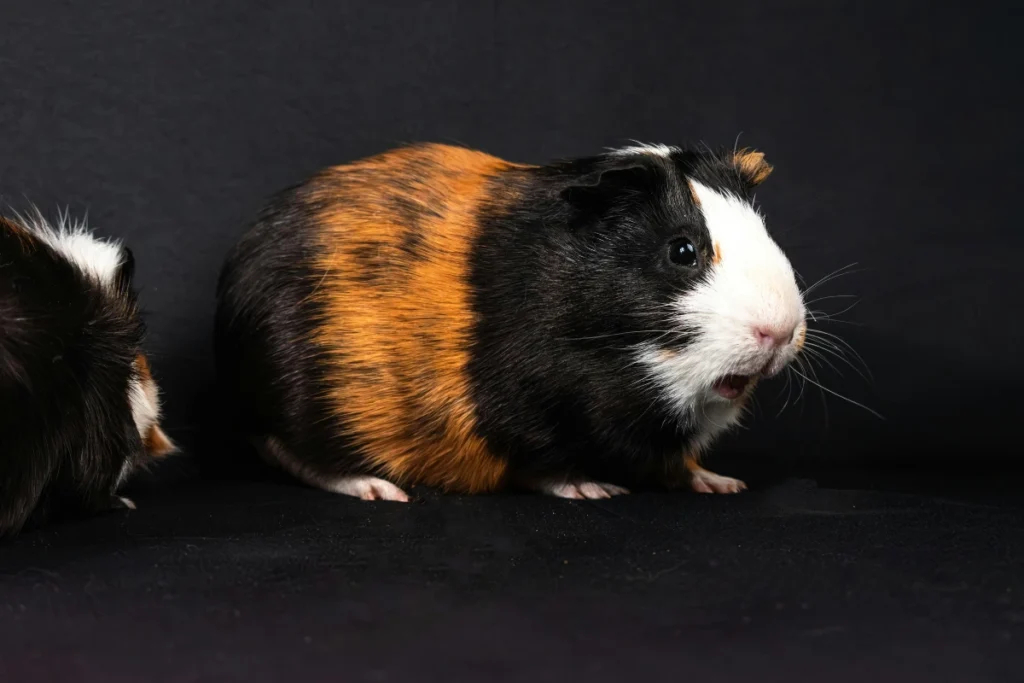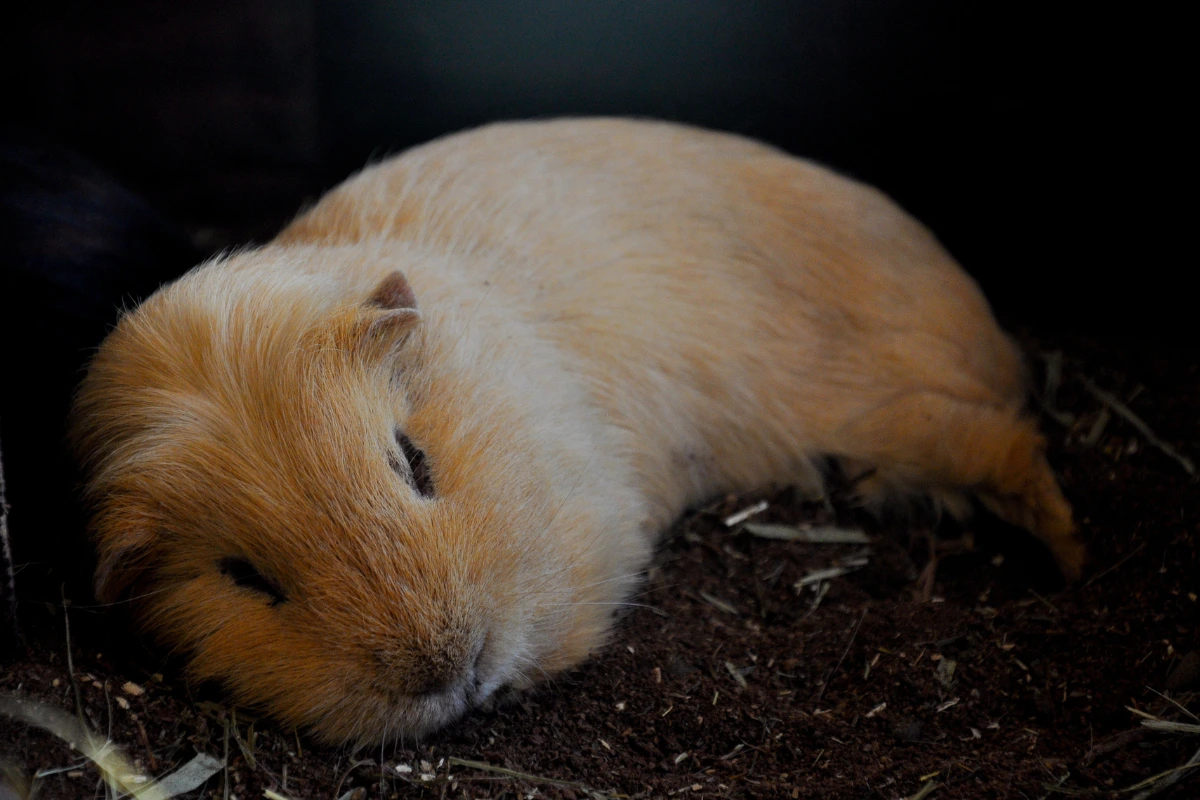Are guinea pigs nocturnal? Many new owners assume they stay active at night like hamsters, but that is not true. Guinea pigs follow a different sleep pattern that may surprise you. Instead of being nocturnal, they are crepuscular, which means they are most active during dawn and dusk. Understanding their sleep habits helps you create a comfortable and stress-free environment for them. In this article, you will learn how guinea pigs behave at night, what affects their sleep cycle, and why staying alert to their nighttime habits is essential for their well-being.
Are Guinea Pigs Nocturnal or Crepuscular? The Truth About Their Sleep Cycle
Explanation of Crepuscular Behavior
Guinea pigs are not nocturnal but crepuscular, meaning they are most active at dawn and dusk. In the wild, this behavior helps them avoid predators that hunt during the day or late at night. Their instincts make them more energetic during low-light hours, which explains why pet guinea pigs often show bursts of activity in the early morning and evening.
How Guinea Pigs Differ from Nocturnal Animals
Unlike nocturnal animals, which stay awake all night and sleep during the day, guinea pigs follow a unique sleep pattern. They take short naps throughout the day and night rather than sleeping for long periods. Nocturnal pets like hamsters or owls remain active in complete darkness, while guinea pigs stay alert in both daylight and nighttime settings. Their vision and senses allow them to adjust to different lighting conditions without relying on total darkness or bright light.
Why Understanding Their Sleep Cycle Is Important for Pet Care
Knowing how guinea pigs sleep helps owners create a better living environment. Since they rest in short cycles, loud noises and sudden disturbances can stress them. Keeping their habitat in a quiet, dimly lit area ensures they feel safe and comfortable. Providing a routine with consistent feeding times and gentle interactions during their active hours strengthens their bond with you. A well-balanced sleep cycle supports their overall health, reducing anxiety and promoting a happy, active lifestyle.
Guinea Pig Behavior at Night – What to Expect
Activity Levels in the Evening and Early Morning
Guinea pigs become most active during dawn and dusk. As the sun rises or sets, they start exploring their surroundings, searching for food, and interacting with their environment. This behavior mimics their natural instincts in the wild, where they forage in low-light conditions to avoid predators.
Unlike strictly nocturnal animals, guinea pigs do not stay awake all night. Instead, they follow a pattern of short bursts of activity followed by brief naps. During the evening, you might see them running around their cage, nibbling on hay, or climbing onto their hideouts. In the early morning, they often become vocal, wheeking for food or attention as they anticipate breakfast. If they have cage mates, they may engage in playful chasing or gentle nudging during these active periods.
Sounds and Noises Guinea Pigs Make at Night
Guinea pigs are highly vocal creatures, and their nighttime sounds can vary depending on their mood and needs. Some common noises include:
- Wheeking: A loud, high-pitched squeal that signals excitement, usually when they expect food or attention. If they associate your movements with feeding time, they might wake you up with this noise.
- Purring: A soft, vibrating sound that indicates contentment, often heard when they are relaxed or enjoying petting.
- Chutting: A series of short, repetitive sounds expressing curiosity or happiness as they explore their space.
- Teeth chattering: A sharp clicking noise that signals irritation or a warning to another guinea pig. If you hear this sound frequently at night, it may indicate dominance struggles between cage mates.
- Rumbling: A low, vibrating noise associated with mating behavior or dominance displays.
Since guinea pigs use these sounds to communicate, hearing them at night is normal. However, excessive noise might indicate hunger, stress, or discomfort, so it is essential to check on them if they seem restless.
How to Create the Best Sleeping Environment for Your Guinea Pig
Ideal Lighting Conditions for a Healthy Sleep Routine
Guinea pigs thrive in a natural light cycle that mimics day and night. Since they are crepuscular, exposure to gradual light changes helps regulate their activity levels. Avoid placing their cage in direct sunlight, as excessive brightness and heat can cause stress and overheating. On the other hand, keeping them in complete darkness for long periods is unnecessary, as they do not rely on darkness to sleep like nocturnal animals.
A well-lit room with natural daylight exposure during the day and dim lighting in the evening supports a healthy routine. If artificial lighting is necessary, use soft, warm lights rather than harsh, bright ones. A dimly lit room in the evening allows them to remain active without disrupting their natural instincts. At night, keeping a low-light environment with minimal disturbances ensures they get adequate rest.
Proper Cage Setup to Ensure Comfort and Safety
A well-structured cage plays a crucial role in helping guinea pigs feel secure and relaxed, especially at night. Start with a spacious enclosure that allows free movement, as cramped spaces can cause stress. Use soft, absorbent bedding like fleece or paper-based material to keep them comfortable and reduce noise when they move around at night.
Adding hideouts and tunnels gives them a sense of security, allowing them to retreat whenever they feel anxious. Ensure their food and water are easily accessible so they can nibble throughout the night without difficulty. Keep the cage in a quiet area of your home, away from loud TVs, barking dogs, or other sudden noises that could startle them.
Temperature control is also important. Guinea pigs are sensitive to temperature changes, so keep their environment between 65-75°F to prevent discomfort. Avoid placing the cage near air vents, heaters, or windows where cold drafts or excessive heat might affect them.
Tips to Reduce Nighttime Disturbances for Both Guinea Pigs and Owners
Guinea pigs’ nighttime activities can sometimes be noisy, affecting your sleep if their cage is near your bedroom. To minimize disturbances, follow these tips:
- Feed them before bedtime: Providing fresh hay and vegetables before you sleep can keep them occupied and reduce excessive wheeking at night.
- Offer enrichment toys: Chew toys, tunnels, and foraging activities help keep them engaged, preventing boredom and restlessness.
- Reduce loud external noises: Keep their cage in a quiet part of the house to avoid startling sounds from TVs, music, or household activity.
- Use white noise or soft background sounds: A gentle fan or ambient noise machine can help mask sudden sounds that might startle them.
- Cover part of the cage at night: Draping a breathable cloth over one section of the cage provides a cozy, darker space while still allowing airflow.
By creating a calm and secure environment, you help your guinea pigs feel safe while ensuring their nighttime habits do not disrupt your sleep.
Check out for more ideas.
6 Powerful Reasons to Stay Alert to Your Guinea Pig’s Nighttime Habits

1. Unusual Noises Could Indicate Health Issues
Guinea pigs are naturally vocal, but sudden changes in their sounds may signal health problems. Wheezing, coughing, or labored breathing can indicate respiratory infections, which require immediate attention. Excessive teeth grinding may suggest pain, while a lack of vocalization in a normally talkative guinea pig could mean stress or illness. Paying attention to nighttime noises helps detect early signs of health concerns before they become severe.
2. Guinea Pigs Might Be More Active Than You Expect
Many new owners assume guinea pigs sleep for long stretches at night, but their sleep cycle consists of short naps throughout the day and night. They often wake up multiple times, moving around their enclosure, eating, or playing. Some may even popcorn suddenly jumping in excitement especially if they have a spacious and enriching environment. Their unpredictable bursts of activity can be surprising, especially for light sleepers.
3. They May Need Food and Water Replenishments
Guinea pigs have a high metabolism and need constant access to food and water. They nibble on hay throughout the night to maintain their digestion and dental health. If food or water runs out, they may become restless, wheek loudly, or even chew on cage bars to get attention. Ensuring they have fresh hay, pellets, and a full water bottle before bedtime helps keep them comfortable and satisfied.
4. Temperature Changes Affect Their Comfort
Guinea pigs are sensitive to sudden temperature fluctuations, which can make them uncomfortable or even sick. If the room gets too cold, they may burrow into their bedding or huddle together for warmth. If it becomes too hot, they might become lethargic and drink more water than usual. Keeping their environment between 65-75°F helps prevent stress and potential health issues related to extreme temperatures.
5. Signs of Stress or Loneliness
Guinea pigs are friendly animals that do best when they have company. A single guinea pig may become anxious or lonely, leading to excessive vocalizations, pacing, or chewing on cage bars at night. Even in pairs or groups, stress can arise if their environment lacks enrichment or if they feel unsafe. Providing hideouts, interactive toys, and a peaceful atmosphere can help reduce stress and promote a sense of security.
6. Cage Mates Can Cause Nocturnal Disruptions
If guinea pigs share a cage, their nighttime interactions can sometimes lead to disturbances. Playful chasing, dominance displays, or minor disagreements over space or food may occur. In bonded pairs, one guinea pig’s movement may wake the other, leading to bursts of activity. Ensuring each guinea pig has enough space, multiple food and water sources, and separate hideouts minimizes conflicts and promotes a harmonious environment.
Final Thoughts – Understanding and Adapting to Your Guinea Pig’s Schedule
Guinea pigs are not nocturnal but crepuscular, meaning they are most active during dawn and dusk. They follow a unique sleep cycle, taking short naps throughout the day and night rather than sleeping for long periods. Their activity levels, vocalizations, and interactions with their surroundings may continue even after the lights go out. Creating a comfortable environment with proper lighting, a well-structured cage, and minimal disturbances helps them feel safe and secure.
Establishing a consistent routine helps guinea pigs feel more at ease in their environment. Regular feeding times, gentle interactions during their active periods, and a stable light-dark cycle contribute to their well-being. Observing their behavior at night can also provide valuable insights into their health. Unusual noises, restlessness, or changes in activity levels may indicate stress, discomfort, or underlying health issues that require attention.
Understanding and adapting to a guinea pig’s natural sleep habits is key to responsible pet ownership. Providing a quiet, enriching, and temperature-controlled environment ensures they stay comfortable and stress-free. Paying attention to their nighttime behaviors, ensuring they have constant access to food and water, and maintaining a peaceful atmosphere contribute to their overall happiness. By respecting their needs and making small adjustments to their care routine, owners can build a stronger bond with their guinea pigs while ensuring their well-being.

